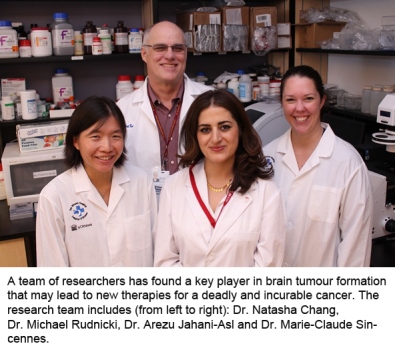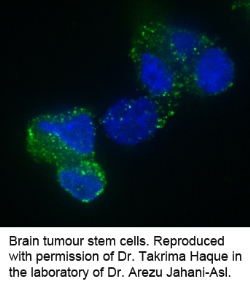Cancer Life-Sentence Reprieve
"It means that this protein is a key piece of the puzzle and could be a possible target for future treatments."
"If we block the function of this Achilles heel [Oncostatin M Receptor], the tumor can't grow and disappears. This is all done in a mouse of course."
"Within our lifetime if it's all successful, but it's a long difficult path to bring these treatments to clinic."
Dr. Mijchael Rudnicki, Director, Regenerative Medicine Program, The Ottawa Hospital
"[Glioblastoma] is really heartbreaking. These patients don't have a lot of hope right now. That is what drives me to study this."
Dr. Arezu Jahani-Asil, assistant professor, department of oncology, McGill University, Jewish General Hospital, Montreal

"It is very exciting to have not only these new findings, but the possibility of new treatments. This is a very devastating disease. I am one of the lucky few who have made it to the three-year [survival] mark. Only a small percentage of patients do."Diagnosed with brain cancer in 2013, Denis Raymond is a living anomaly among people with similar diagnoses; glioblastoma, the deadliest form of brain cancer. He took part in the medical trial of an experimental therapy in the field of electromagnetic therapy. And the research, to block Oncostatin M Receptor (OSMR), in his excited and hopeful opinion holds out great promise as an effective treatment for glioblastoma.
"When people are in my situation, it is very much day-to-day living. For me, being a three-year survivor is phenomenal. I am finally in a place that I can look at next year."
Denis Raymond, 29, Ottawa teacher
Now, a team of Ottawa researchers has published the findings resulting from their research into a treatment for glioblastoma, published in the journal Nature Neuroscience. Led by Dr. Jahani-Asl while she was a post-doctoral fellow under Dr. Rudnicki in Ottawa, the discovery was that a protein called OSMR is the handmaiden of bioblastoma; without that protein's presence the cancer tumours cannot form.

It was obvious to the research team that blocking the OSMR activity in brain stem cells should be their target. Blocking OSMR served to prevent them from forming tumours in laboratory mice. The research findings offer a new perspective on treatment of this difficult and deadly cancer, offering the hope that OSMR-targeted therapies might improve the prognosis for glioblastoma patients.
And glioblastoma patients need all the help they can get from medical science, to prolong their lives.
The diagnosis of glioblastoma is a grim one. Patients receiving that information soon learn that treatments currently available are limited in their efficacy. The condition is resistant both to radiation and therapy. And it is extremely difficult to surgically remove. Most people given that diagnosis survive a mere sixteen months.
"To finally be free of the constant worrying and constant thought of being faced with my own mortality, it's very exciting, very exciting", understated Denis Raymond.

29-year-old Denis Raymond at Ottawa Cancer Centre.
Labels: Bioscience, Cancer, Heatlh, Medicine, Ottawa

0 Comments:
Post a Comment
<< Home